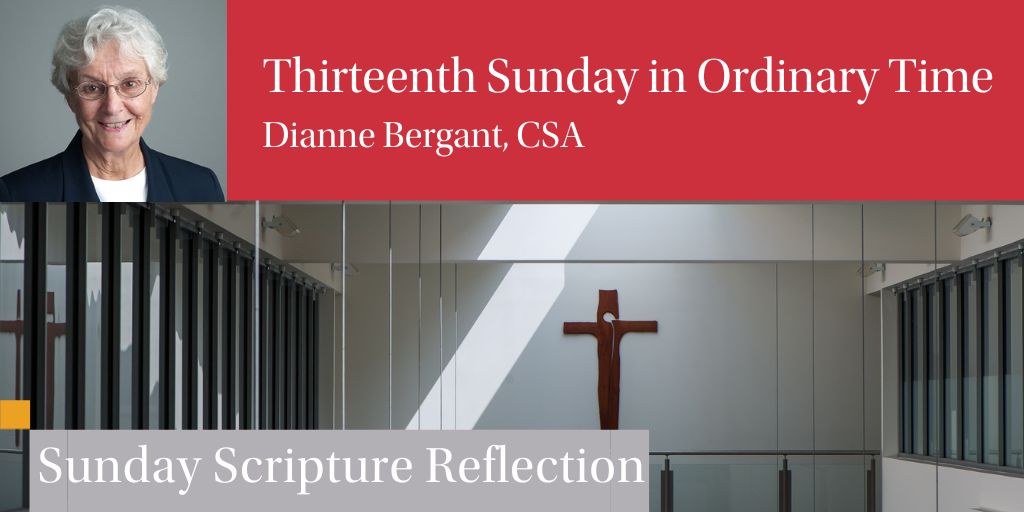
Readings:
Reading I: I Kgs 19:16b, 19-21
Psalm 16: 1-2, 5, 7-11
Reading II: Gal 5:1, 13-18
Gospel: Luke 9:51-62
The Cost of Discipleship
The great Lutheran theologian Dietrich Bonhoeffer wrote a series of reflections on the Sermon on the Mount entitled The Cost of Discipleship. In them, he maintained that discipleship requires that we make a fundamental decision to follow Jesus and accept the consequences of that decision. The ultimate ‘cost of discipleship’ was exacted on Bonhoeffer himself when, on April 9, 1945, he was hanged by the Nazis for his participation in the German resistance and his involvement in attempts to assassinate Hitler. While discipleship might force some people to decide between life and death, few of us will be asked to pay that ultimate price. However, genuine discipleship does call us to live in a way that, at times, may require a certain degree of heroism.
The readings for today demonstrate this ‘cost of discipleship.’ Elisha was required to leave his parents if he wished to be a disciple of the great prophet Elijah. Since kinship was probably the strongest tie in the ancient Near Eastern world, to leave one’s family involved more than emotional detachment. Some saw it as turning away from one’s most basic responsibilities, as well as from the support and protection that this fundamental bond guaranteed. Only with grave reason did one set them aside. Elisha was not forced to follow Elijah. In fact, the prophet responded to Elisha’s hesitation: “Go back! Have I done anything to you?” However, once Elisha made his decision, he not only left his home, but also destroyed the tools of his former occupation. In this way, he indicated that the break with his former life was complete and there was no turning back.
The people who wished to follow Jesus were also told that they must leave behind all family responsibilities and privileges. Furthermore, they would have to learn to live without the security of a stable home. Finally, like Elisha before them, this commitment would have to be complete. No looking back. If we read the gospels carefully we find that only some of the very closest disciples of Jesus were asked to leave all and follow him, yet this story seems to imply that everyone was expected to make that kind of sacrifice. Is there a contradiction here? Are only some asked to follow Jesus closely? We know that Martha, Mary, and Lazarus were very close to Jesus, yet they were not numbered among Jesus’ constant companions. They lived in Bethany. It is safe to say that the biblical writers are arguing that commitment to the service of God supersedes all other valid commitments. However, there are many different ways that this commitment can unfold.
It is no different today. Not everyone’s call to follow Jesus requires leaving one’s family. For many people, it is precisely within the family that discipleship expresses itself. The point is total commitment. Parents are certainly required to commit themselves wholeheartedly to their children, and adult children often find themselves in similar situations with their aging parents. It may be true that some occupations, by their very nature, demand more of us than do others. Still, regardless of our call in life, discipleship requires unselfish commitment.
We should not overlook the first episode in the gospel passage. There we see James and John, two of Jesus’ closest disciples, irate because the people in a Samaritan village did not welcome their ministry. In their anger, they asked that Jesus allow them “to call down fire from heaven to consume them.” Jesus said nothing about the Samaritans, but he rebuked his disciples. This shows that full-time ministers are not necessarily more committed than other followers of Jesus. They must always be on their guard against the allure of success and personal aggrandizement.
Paul provides us with some direction for living out our discipleship. He exhorts the early Christians: “Stand firm and do not submit again to the yoke of slavery,” and “love your neighbor as yourself.” The slavery to which he refers is the erroneous idea that fidelity to the law or to religious practices is what saves, rather than faith in Jesus and a way of life that reflects that faith. Elisha and the individuals in the gospel were directed to put their commitment above even the most cherished values of their cultures; we are directed to do the same. There certainly are values or social customs that tend to yoke us in a kind of slavery. Political and social pressures can result in disdain for those who are different. We certainly see that in our country today. Advertising often perpetuates avaricious consumerism and self-indulgence. And who has not at times felt enslaved by technology? How should a disciple act in such situations?
Paul’s second directive needs no interpretation. Love does not mean ‘you never have to say you’re sorry.’ It means that we stop “biting and devouring one another.” It means that we make peace in our families, at our workplaces, in our country, and in our world. It means that we live lives that “are guided by the Spirit.” This is not always easy. The very popular slogan ‘What would Jesus do?’ invites us to look anew at ‘the cost of discipleship’ in today’s world.
Carroll Stuhlmueller, CP, Distinguished Professor Emerita of Old Testament Studies
